Criterion Blu-ray review: Wim Wenders’ The Road Trilogy (1974-76)
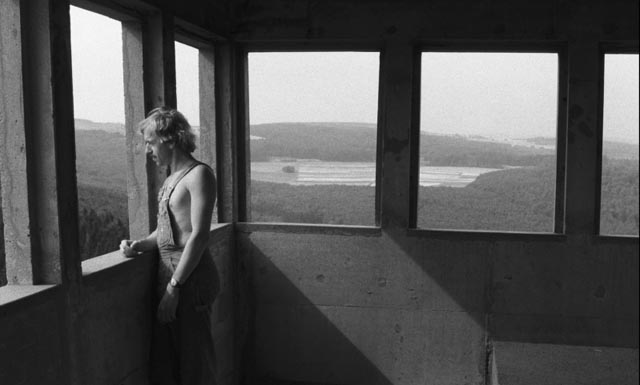
From the late 1950s into the ’70s many major national cinemas went through great upheavals as postwar stability began to give way to demands for social and political change. While the French Nouvelle Vague stands out as the dominant example, similar movements arose in Britain, Czechoslovakia, Japan, the U.S. and Germany. But this wasn’t a uniform global movement; different nations gave rise to different types of change.
In France, much of the New Wave was a reaction to what was perceived as a conservative cinema steeped in stale conventions (a view promulgated by the young critics-turned-filmmakers who wrote for Cahiers du Cinema); despite widely varying personalities, most of the New Wave directors were engaged in a self-conscious effort to forge a new and freer style of movie-making. In Britain, there was less of an attempt to throw out stylistic conventions; it was more a matter of opening up permissible subjects to include a wider range of class interests and a variety of regional cultures. In Czechoslovakia, it was a reaction to a perceived loosening of Socialist demands for a particularly rigid depiction of society.
In Germany, emerging from the shadow of the Nazi period and World War Two, there was a discernible attempt to find a way to redefine a national culture still reeling from guilt. Most of the New German Cinema filmmakers were born into the late years of Naziism or just after the regime’s collapse in 1945. Some of these filmmakers took an approach steeped in philosophical traditions re-purposed for the task: Volker Schlondorff used the techniques of literature (frequently adapted from major novels like Robert Musil’s Young Torless and Gunther Grass’ The Tin Drum) to forge a classical analysis of the roots of Fascism. Alexander Kluge was more radical, often using seemingly crude and amateurish techniques to smash the conventional relationship between viewer and narrative cinema, to create a space in which he could explore a Marxist interpretation of German history and society. Hans-Jurgen Syberberg drew on traditions of 19th Century theatre and opera to create a monumental meditation on the German popular culture and philosophical traditions within which Fascism was rooted.
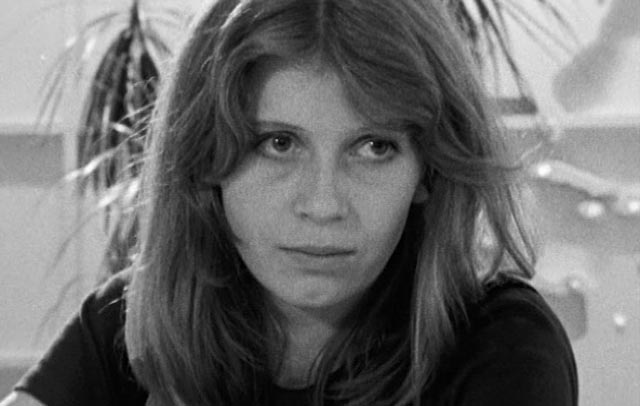
While these filmmakers frequently looked back to seek some kind of understanding of recent German history, others were more concerned with looking at the present and even future, creating a new idea of German society. But even here, the approaches varied widely, from Rainer Werner Fassbinder’s gay-inflected theatricality to Werner Herzog’s myth-making cinema in which obsessed individuals fight mighty struggles against social constraints and a hostile natural world.
Amongst all this company, Wim Wenders initially appears to be rather modest. Much of his work (at least in the early stages of his career) seeks to observe place and character without any attempt to impose a theory or create worlds. He seems the most humanistic of the New German Cinema filmmakers and one strain of his work evokes a sense of poetic realism. In later years, he began to make bigger and in many ways more cumbersome films which, for all their craft, are ultimately less satisfying than his more modest projects. Perhaps the chief difference between these two strands of his work is the degree to which narrative takes precedence. For all its visual beauty, Wings of Desire (1987) eventually sinks into bathos, its grand concept reduced to a trite romance steeped in the most banal Hollywood cliches.
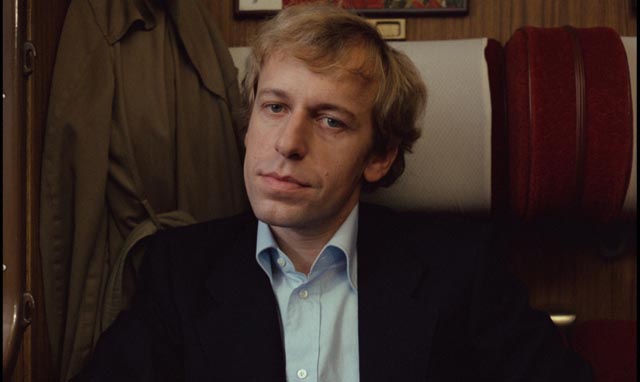
But his earlier work was often concerned with exploring the ordinary details of life, story taking a back seat to precisely observed moments and behaviours. It’s no coincidence that much of this early work centred on characters moving from place to place, seeing things and briefly encountering other people before moving on again.
Made the year after he graduated from film school, Wenders’ first feature, The Goalie Fears the Penalty Kick (1972), was adapted from his friend Peter Handke’s novel. It established much that would define the works to follow: a character on the road, moving away from or towards something vaguely undefined; a narrative which the director keeps almost completely outside the frame as he focuses on the minutiae of the protagonist’s behaviour. Perhaps most importantly, it forged a connection with two people who would play a key part in the director’s subsequent career; cameraman Robbie Muller and editor Peter Przygodda. It also got him commissioned to direct a more mainstream movie, an adaptation of Hawthorne’s The Scarlet Letter (1973).
If nothing else, the latter experience made Wenders fully aware that he had to make movies to which he was personally fully committed. He disliked the experience completely – except for one brief moment, a ten-second encounter between a sailor and Hester Prynne’s daughter, Pearl. Looking at that moment in the editing room, Wenders decided that he wanted his next film to be about a man and a young girl played by these two actors, Rudiger Vogler and Yella Rottländer. And it was in the making of that film, Alice in the Cities, that he fully discovered himself as a filmmaker.
Although there had been great road movies before Wenders, he raised the genre to the level of high art with Alice and the two films which followed, films which would subsequently be designated by critics as “the road trilogy” (although at the time, Wenders did not consciously conceive them as such).
*
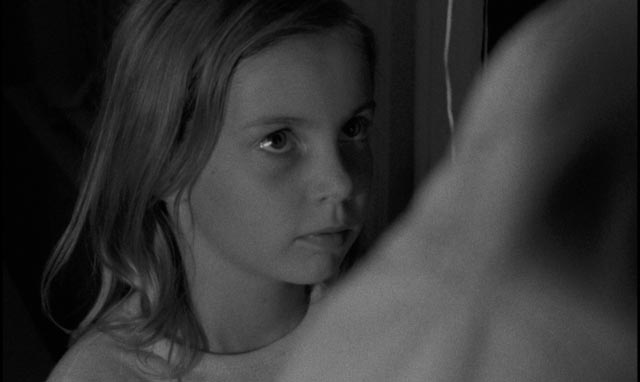
Alice in the Cities (Alice in den Städten, 1974)
Alice in the Cities (Alice in den Städten, 1974) is a deceptively simple film, apparently a study in ennui and alienation. It begins with journalist Philip Winter (Vogler) on the road in the States. He’s searching for something, but it isn’t clear what that might be. He takes endless Polaroid photos and as they form, he holds them up to compare them to what he’s seeing, only to find that no picture can actually capture what he sees. When he returns to New York at the end of his tour, the editor at the agency he is working for is disgusted that he has written nothing, merely accumulated stacks of “postcards”. Winter insists that he will write an article about why he has taken all the pictures, but the editor dismisses him and refuses to give him another advance.
Trying to book a flight home to Munich, and discovering that all German-bound planes are grounded because of an air traffic controller strike, Winter meets a German woman at the ticket counter. She speaks no English and they make one of those passing connections by which displaced people briefly join together to help one another. This woman Lisa (Lisa Kreuzer) has a nine-year-old daughter Alice (Rottländer). Having booked a flight to Amsterdam for the next day, Winter helps them find a hotel room and goes to look up a former girlfriend who turns out not to be pleased to see him. Turned away, he returns to Lisa’s hotel and spends the night in her room. In the morning, Lisa has gone, leaving a note saying she’ll meet him and Alice later. But she doesn’t turn up and Winter finds himself inadvertently the guardian/companion of the young girl.
The rest of the film deals with their sometimes prickly relationship as he takes her back to Europe, waits for Lisa to show up, then takes Alice on the road to Germany in an attempt to find her grandmother. On a narrative level, much of this might seem implausible – a mother leaving her little girl with a stranger, the stranger embarking on a long journey with the girl. It would probably be impossible to make such a film now because an audience would be appalled by the mother’s behaviour and deeply suspicious of the motives of the man.
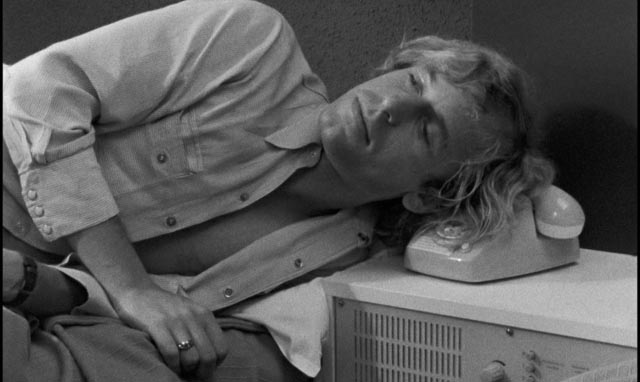
What is wonderful about Alice in the Cities, though, is its air of innocence. There isn’t a trace of condemnation or suspicion, but rather a warm but completely unsentimental depiction of two human beings gradually coming to understand and like each other. Winter gradually forgets the sense of pointlessness which has been crippling him because Alice exposes him to an unguarded sense of life in the moment.
Shot on 16mm black-and-white negative, the image is grainy and yet paradoxically warm. Wenders and Muller have a vital sense of place (every location is viewed with a kind of alert fascination) and they are finely tuned to every nuance of the characters’ expressions. This is a portrait of a world which is steeped in the potential for connections between human beings, a world which is warm and full of possibilities; and the film ends with a generous sense of openness, the feeling that both Winter and Alice can deal with life and whatever it brings their way.
While Wenders’ observational and expressive skills are fully manifest here, what gives the film its special quality is his willingness to allow these two actors (and to a lesser degree Lisa Kreuzer in her few brief scenes) simply to be with one another. He, like the viewer, is fascinated by the ways in which they interact and the ease and naturalness of both performances is immensely satisfying to watch. Vogler has great charm, but Rottländer is remarkable, giving one of the finest performances by a child actor ever caught on film. (Interestingly, she didn’t go on to an acting career, but actually became a doctor.)
Although Wenders did draft a script for the film, much of it was thrown out in the process of shooting, with the actors improvising a great deal (Rottländer told him that trying to memorize his written lines would only make her sound false, so instead she paraphrased in her own words). The experience confirmed for the filmmaker that his ideal would be to shoot an entire film without a script. That would come two years later, but the film which followed Alice in the Cities was entirely scripted and the director and actors stuck faithfully to every word of the text.
*
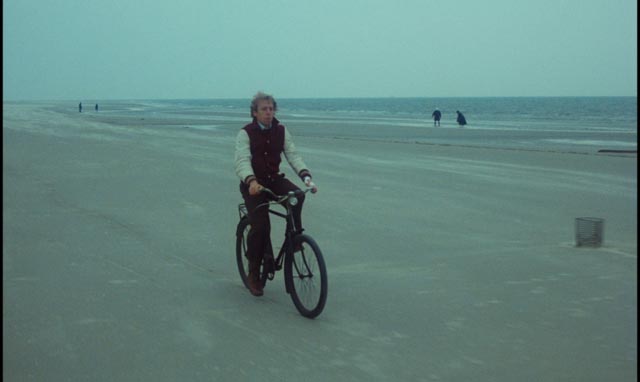
Wrong Move (Falsche Bewegung, 1975)
Wrong Move (Falsche Bewegung, 1975) was adapted by Peter Handke from Goethe’s novel Wilhelm Meister’s Apprenticeship (1795-96), one of the key works of German Romanticism. While it is book-ended by two remarkably laconic films which express so much through images alone, Wrong Move is awash with words. Its characters virtually never stop talking – they recount dreams, quote poetry, probe each other’s ideas and feelings, declaim – and whenever they do fall silent, Wilhelm’s voice fills the spaces as he ruminates on life, art, and the meaning of events. The other striking contrast between this and the preceding and following films is that while they are shot in richly expressive black-and-white, Wrong Move explodes with lush, vibrant colour. If this is indeed a genuine trilogy, then aesthetically and stylistically, Alice is the thesis, Wrong Move the antithesis, and Kings of the Road the melding of both into a fully realized synthesis.
The two black-and-white films manage to feel relaxed and improvisatory, while Wenders approaches Handke’s script for Wrong Move with great formal rigour. Robbie Muller’s camerawork here is as full of balanced compositions and flowing movements as in the other films, but rather than feeling like skillfully captured documentary moments, the scenes in the second film have a certain degree of artifice, as if the screen were a mobile canvas rather than an opening on the world. The characters are contained rather than freely observed. This approach reinforces Handke’s themes, or rather gives them vibrant life.
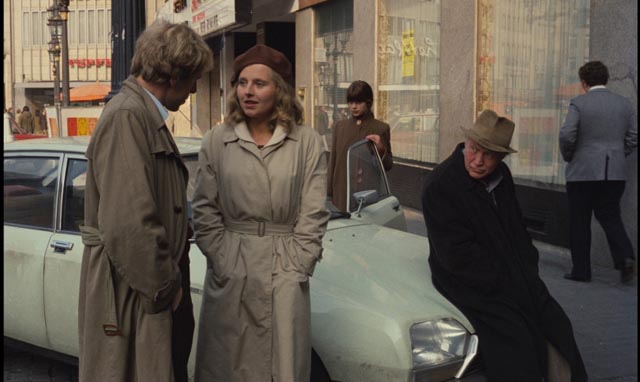
In his adaptation, Handke has inverted Goethe’s original theme – the Romantic idea that the sensitive Wilhelm must go out into the world, embrace experience, engage with others, in order to fully become himself as a thinking, creative being. In Wrong Move, Wilhelm begins in frustration, trapped by his desire to be a writer and yet not knowing what he wants to write or whether there is any genuine purpose in writing at all. He leaves his mother’s home and sets off across Germany, on bike, on train, in cars, and most of all (in contrast to the other two films) on foot. But the world remains stubbornly opaque to him, other people unknowable. He ends his journey alone on a mountaintop, looking out over the landscape and realizing that his entire journey was in the wrong direction – the title’s “wrong move”. To know himself, and thus the world, he should have been looking inward.
In this sense, the film is deeply anti-Romantic. But, thanks to Wenders and Muller’s art, every step of this ultimately unfulfilling journey is fascinating. While Rudiger Vogler is a passive centre, waiting for things to reveal themselves to him, the people he meets are intriguing representatives of various social, historic and aesthetic types. Hanna Schygulla, as the actress Therese Farner, is an idea of the female, a woman whose role is to be the romantic object of a man’s desire, here forced to assert herself in the face of Wilhelm’s passivity. Peter Kern is Bernhard Landau, a dilettante poet who provides a glimpse of what Wilhelm himself could only too easily become. Hans Christian Blech is Laertes, an itinerant street performer traveling with Mignon (Nastassja Kinski), a silent waif whose unformed sexuality is a bigger draw for Wilhelm than Therese’s fully developed erotic nature.
Although Wilhelm moves among the group, trying to glimpse various possibilities, he always holds back. This is clearest in his relationship with Laertes, with whom he has the longest, most philosophical conversations in the film. The old man repeatedly drops hints about his past, saying that he will tell all later, or the next day, or at breakfast; clearly, he was a Nazi, and his hints suggest that he may well have been more than a mere fellow-traveller. The weight of German history presses on him, to the degree that he gets spontaneous nosebleeds when he comes close to revealing unpleasant truths; but Wilhelm ultimately refuses to hear his story, violently driving the old man away. This refusal to confront the darkness of history is at the heart of Wilhelm’s failure to learn anything of value about life. Yet that history by definition has irrevocably shaped the country through which he travels and thus the lives of all who live in it, just as it shaped the lives of Wenders’ and Handke’s generation.
*
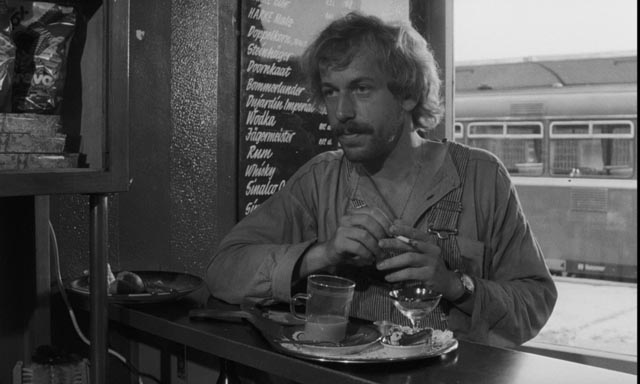
Kings of the Road (Im Lauf der Zeit, 1976)
I’ve actually always disliked the English title of the third film. “Kings of the Road”, although referenced in the film through dialogue (the character Robert Lander nicknames Bruno Winter “king of the road”) and on the soundtrack (the film ends with Roger Miller’s song “King of the Road”), makes it sound like a Burt Reynolds/Jerry Reed buddy movie. Even though that comparison has a certain validity, through contrast rather than direct resemblance, the German title is far more resonant and apt: Im Lauf der Zeit translates as “in the course of time” (interestingly, a line spoken in sleep by Wilhelm in Wrong Move), a phrase which conveys the languid flowing rhythm of the film.
Kings of the Road is the film Wenders had wanted to make for some time; that is, it was made without a script. Wenders came up with a basic structure and a pair of characters, then with a minimal cast and crew, he set out on the road for several months, responding to the landscape and inventing scenes and incidental characters as they went. One of the most remarkable things about this masterpiece is that, at three-hours, it has such a consistency of tone and theme, held together by nuanced performances and, once again, Robbie Muller’s superb photography.
In this quintessential road movie, plot is movement through landscape. That landscape is the countryside and small towns along the border between West and East Germany, a divide which underlines the lives of the characters without ever needing to be overtly stated. Rudiger Vogler, by now Wenders’ obvious alter-ego, is Bruno Winter, conceptual brother to Alice in the Cities’ Martin Winter. He lives out of his truck, driving up and down the border, servicing and repairing the projectors of small movie theatres which are struggling to survive. (Towards the end of the film, he visits a theatre owned by a grandmother which is now showing porn; later, he talks to an embittered theatre owner who says that it’s better to close than be forced to show the only things that can make money these days.)
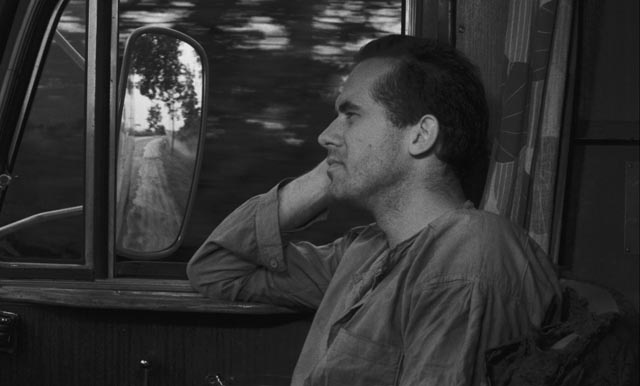
Parked by a river one morning, shaving in the truck’s rearview mirror, Bruno sees a Volkswagen speeding down the dirt road and racing out into the river. The driver, Robert Lander (Hanns Zischler), has half-heartedly attempted suicide after separating from his wife. When he swims ashore, Bruno offers him dry clothes, and purely by chance they begin to travel together. In contrast to Wrong Move, these characters don’t really talk much. Each lives in a state of isolation, Bruno acquiescing, Robert tormented by a sense of failure. Their isolation and dislocation echo the emptiness of the landscape, the seeming emptiness of the small, dying towns. These are two men living in a Germany which has been torn in half and is unable to stem the flow of life out of its wounds.
Within this framework, Wenders expands on a theme first explored in Alice in the Cities, the place of movies, of images in general, in contemporary life and the influence of American pop culture on the weakened spirit of Germany. Much of the film’s music comes from a small portable record player in the truck on which Bruno plays American rock’n’roll songs; there are (as in Alice) passing references to John Ford, one of Wenders’ heroes. Late in the film, Robert speaks the oft-quoted aphorism which (perhaps a little too pointedly) defines one of the main concerns of Wenders’ entire body of work: “the Yanks have colonized our subconscious!” (This is the theme of his next feature and first big international success, The American Friend [1977].)
But while history and questions of culture run through the film, it is really about the flow of time, the ways people drift through life, accumulating through chance and coincidence the bits and pieces which eventually blend together to form who they are. The film takes two lengthy digressions: Robert separates from Bruno for a while to go back and visit his father, a smalltown newspaperman he hasn’t seen in eight years. Here, as he berates his father for oppressing Robert and his now-dead mother, we glimpse the roots in a history of patriarchal control of the psychic damage which destroyed Robert’s own marriage. And yet, having finally confronted his bitterness and resentment, there’s a hint of reconciliation by the time Bruno shows up in the morning to collect Robert and continue their journey.
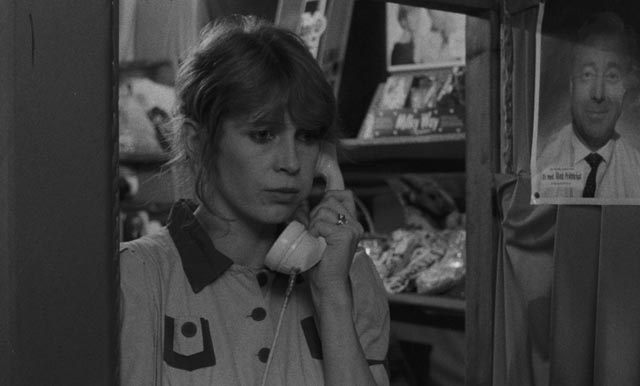
The second diversion is more oblique, less revealing. On a borrowed motorcycle, the pair travel hundreds of miles to the Rhine Valley to revisit the place where Bruno grew up. Here they find an empty house by a river. There are no revelations, no key to understanding Bruno, just a sense of emptiness and absence.
And yet Robert’s encounter with his father does illuminate Bruno’s problem to some degree. This is a film about men and the ways in which men are raised without an understanding of women. These two strangers, meeting by accident, traveling together for a while, have an obvious largely unspoken affinity with one another. But neither can relate fully to women. Bruno has a brief encounter with the cashier at a small theatre (Lisa Kreuzer), but he can’t overcome his sense of detachment sufficiently to make an emotional connection. It’s as if the weight of Germany’s terrible history has, for these men, foreclosed on the possibility of a positive emotional life. The emptiness Wilhelm feels at the end of Wrong Move here trumps the openness and sense of possibility we see at the end of Alice in the Cities. For a moment, as they join together on their journey, Bruno and Robert provide companionship, a brief respite from loneliness, but in the end each goes his own way once again.
The disks
Criterion’s Blu-ray set showcases recent restorations by the Wim Wenders Stiftung, a foundation the director set up to save films which were already in very rough shape. The technical work performed on battered negatives is remarkable, each film displaying a richly detailed image – Alice was shot on 16mm and as a result shows high levels of grain, while the two 35mm features are clean and vibrant. All three do full justice to Robbie Muller’s superb photography, and Martin Muller’s production sound is clear throughout.
The supplements
In one of their best releases so far this year, Criterion have provided a substantial collection of supplements to give context to the trilogy, beginning with commentary tracks on all three films. On Alice, Wenders is joined by Rudiger Vogler and Yella Rottländer for a German language track recorded in 2005; on Wrong Move, Wenders is solo in English on a track from 2002; and on Kings, Wenders is solo again, this time in German from 2005.
On disk one, an interview featurette with Vogler, Kreuzer and Rottländer (27:22) covers the intimate, semi-improvisatory nature of the production. There’s a selection of outtakes and behind-the-scenes footage (16:20) and a featurette on the complex process of restoration (15:16), plus two of Wenders short student films, both essentially formal exercises: Same Player Shoots Again (1967, 12:34) and Silver City Revisited (1968, 33:12).
On disk two, in addition to an interview featurette with Vogler and Kreuzer about the production (21:50) and some super-8 behind-the-scenes footage (4:06), we get the set’s most substantial extra, a lengthy (1:04:03) interview with Wenders conducted by filmmaker Michael Almereyda. This is essential viewing, a relaxed and insightful tour of the director’s philosophy and filmmaking practice.
Disk three has more interviews (31:22) with Vogler, Zischler and Kreuzer, and a collection of silent outtakes (21:10) accompanied by music from Axel Linstädt’s score.
The accompanying booklet contains four essays, one on the trilogy by Almereyda, and one on each film: Allison Anders on Alice in the Cities, James Robison on Wrong Movement, and Nick Roddick on Kings of the Road.
The Road Trilogy is without doubt one of Criterion’s finest releases in some time, and a fitting tribute to a key work by one of the key filmmakers of the ’70s.
Comments